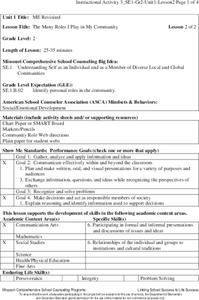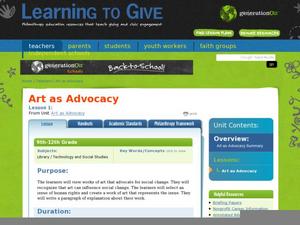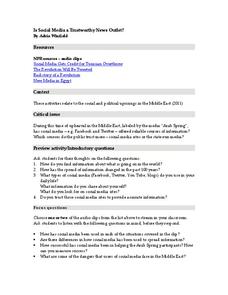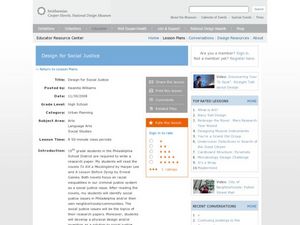Missouri Department of Elementary
The Many Roles I Play in My Community
Small groups brainstorm their roles in the community. Then, individually, complete a community roles web worksheet. Peers share their completed product and extend the conversation to include the feelings and character traits that go...
North Carolina Consortium for Middle East Studies
Using Drama to Address Social Justice Issues in School and the Community
Artists, musicians, and dramatists have long been the leaders in the quest for social justice. To gain an understanding of the power of the arts to address social issues, class members listen to a reading of Drew Daywalt's The Day the...
iCivics
Step One: We've Got Issues
What is the most pressing issue in your community? The resource helps you and your middle schoolers begin the process of doing something about it! Learners compare and contrast two pressing issues in their local counties by reading two...
Facebook
Raising Awareness Through Media
Spread the word! Passionate pupils engage in creating multimedia awareness messages during a digital citizenship lesson plan. Using an example of a community social issue message for ideas, individuals then take the reins and begin to...
The New York Times
Crossing the Line Online: Sexual Harassment and Violence in the Age of Social Media - NYTimes.com
Sexual harassment and sexual violence are by no means new issues. What has changed is the role of social media in these issues. This powerful and troubling instructional activity uses a specific rape case to launch research into a...
Dream of a Nation
Creating Awareness through Action Oriented Writing and Research
Middle schoolers aren't too young to feel strongly about politics, social issues, consumer rights, or environmental problems. Demonstrate the first steps toward social change with a project about action-oriented writing. Eighth graders...
Curated OER
Art as Advocacy for Social Change
“Humanscape No.65” by Melesia Casas and Ester Hernandez’s “Sun Maid Raisins” launch a study of how works of art can advocate for social change. After examining these two works and discussing the human rights issues raised, class members...
Missouri Department of Elementary
Community Wellness Fair
Seniors work with teachers, counselors, and administrators to organize a community wellness fair. Committees take on the responsibility for the various tasks (publicity, set up, hospitality room, agency contact, thank you letters, etc.)....
Missouri Department of Elementary
I’m A Star!
A lesson plan encourages scholars to be star community members. Pupils take part in a class discussion that challenges them to brainstorm at least two ways to show responsibility within one's community. Small groups play a game in which...
Missouri Department of Elementary
An Apple a Day
Three apples—green, red, and rotten—exemplify character traits, negative and positive. Following a discussion about the classroom community, scholars complete an apple-themed worksheet that challenges them to read each trait, color it...
Museum of Tolerance
Improving My Community Through Social Action
Action is the heart of change. Encourage class members to not only identify critical social justice issues in their school or community but to take action as well. As individuals or as groups, they research a situation, develop a...
J. Paul Getty Trust
Picturing a Story: Photo Essay about a Community, Event or Issue
Picture this. Class members follow in the footsteps of W. Eugene Smith, Dorothea Lange, James Nachtwey, and Lewis Hine by creating their own photo essay about a local event or issue.
Social Media Toolbox
A Look at Social Media Policies
Should school news publications use social media if their district is against the use of social media in school? Pupils ponder the policy, then examine their publication's plan in parts seven and eight of a 16-part Social Media Toolbox...
Curated OER
Is Social Media a Trustworthy News Outlet?
Examine the role of social media in social and political uprisings. Pupils listen to NPR audio clips about social media and the Arab Spring and read an article that proposes the idea that revolution will not happen through social media....
Curated OER
Developing Self Awareness.Community, and Exploring Personal Qualities
Older individuals just overcoming homelessness or drug abuse issues, engage in a practical lesson to boost self-awareness. They work through two hours of activities intended to aid them in gaining a self perspective while increasing...
Canadian Civil Liberties Education Trust
That’s Not Fair!
As part of a series of critical thinking exercises, kids consider issues of social justice, especially the factors that must be considered when trying to balance conflicting rights and freedoms.
PBS
“He Named Me Malala”: Understanding Student Activism Through Film
Malala Yousafzai has become the face of social activism. After watching He Named Me Malala and short student-made films about what young people can do to become instruments of change, class members reflect on what it means to be an...
Missouri Department of Elementary
Character Clovers
Build a classroom community with a lesson that uses character clovers to examine scholars' roles. Following a whole-class discussion, participants list four roles they play and accompany it with the character traits that go along with it.
Facing History and Ourselves
Decision-Making: Introduction to the Unit
Make your classroom a supportive and communicative place to be before beginning a unit on the Holocaust. Working together as a class, learners reflect on their previous experiences of classroom discussions before establishing a...
Learning for Justice
Change Agents in Our Own Lives
Everyone has the power to change their own lives. Young historians learn how they can become agents for change in their own lives and the community. The lesson focuses on positive role models and what motivates individuals to promote...
Curated OER
Planning a Service Project
Students examine global issues by planning and participating in a service project. In this Peace Corps activity, students use the provided guidelines to determine the type of service project they will complete in their community and...
Curated OER
NYC Muslim Community Center: Why there? Why not?
Young scholars examine religious diversity issues. In this current events lesson, students read the provided articles "Sacred Ground or Bridging a Cultural Divide?" "Multiple Views of the Proposed Muslim Center," and "Protests, a...
Curated OER
Design for Social Justice
Students create a solution to a social justice problem within their community. In this urban planning lesson, students read To Kill a Mockingbird by Harper Lee and A Lesson Before Dying by Ernest Gaines. Students then complete a research...
Facing History and Ourselves
Taking a Stand: Models of Civic Participation
How does an individual take a stand for a principle or belief? what skills are required to do so? What are the challenges and risks in doing so? Class members study examples of individuals engaging in such activities and then identify...

























